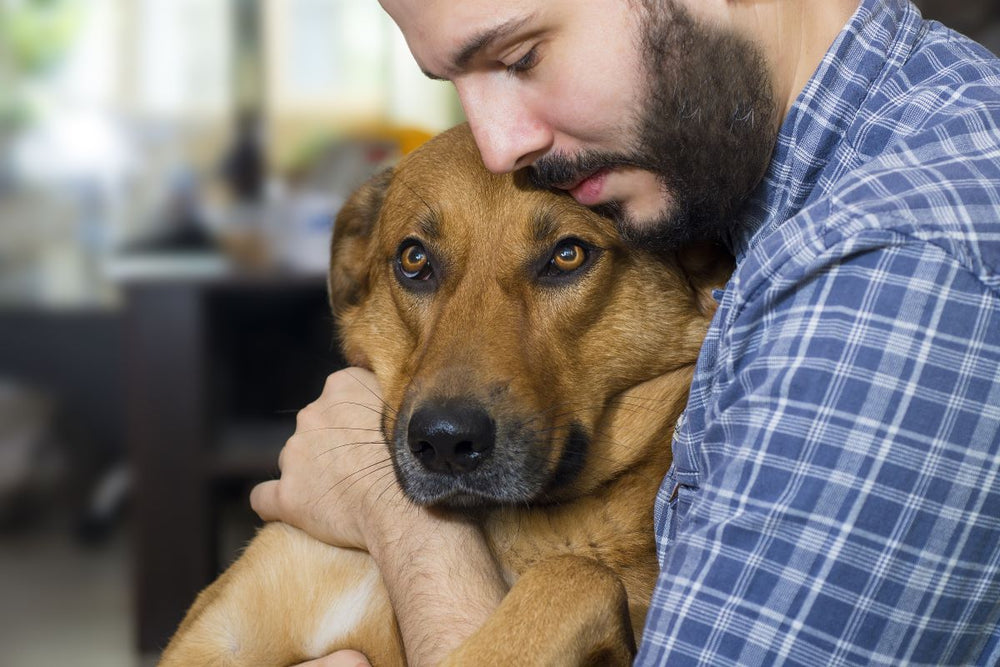By: Dr. Juli, DVM @itsDrJuli
Upset stomachs and diarrhea are one of the most common reasons pet parents bring their pups for a veterinary visit. Resisting sharing your juicy steak with your drooling furry best friend can be challenging. However, feeding your pet table scraps and fatty foods - especially human food - can lead to sick pups and, in some cases, canine pancreatitis.
Pancreatitis is a painful, potentially life-threatening illness in dogs that can be challenging to recognize since signs are similar to other gastrointestinal (GI) problems. As a dog owner, it's critical to be aware of this common illness and what to do if you suspect your furry friend is affected. Here are common pet parent questions about canine pancreatitis and ways you can support your ailing pup.

What is Canine Pancreatitis?
Pancreatitis is a potentially life-threatening illness that results in inflammation of the pancreas, a vital glandular organ located in the abdomen next to the stomach. The pancreas serves two main functions: secreting digestive enzymes to break down your dog's ingested nutrients and secreting insulin and glucagon, which regulate blood sugar levels and how nutrients are used throughout the body.
Inflammation of the pancreas occurs when these digestive enzymes are prematurely activated and released within the pancreas instead of the small intestine, where they usually are activated to further aid digestion. The release of digestive enzymes within the pancreas causes the organ to begin digesting itself, resulting in inflammation and tissue damage. In severe cases, the liver, which is the adjacent organ, can also be affected, leading to a body-wide inflammatory response.
Pets with pancreatitis are also at risk for developing temporary or permanent diabetes mellitus due to the disruption of insulin regulation caused by the damaged pancreatic tissue. Additionally, pancreatitis can cause an increased risk for abnormal bleeding or clotting problems and brain damage in severe cases.

Causes of Pancreatitis in Dogs
Any dog can develop pancreatitis regardless of their age, breed, or sex. However, some breeds have a genetic predisposition that increases the risk of developing the disease, including miniature schnauzers, English cocker spaniels, dachshunds, and Yorkshire terriers. In most cases, the underlying cause is unknown. However, a common pancreatitis trigger is ingesting high-fat foods or table scraps.
Other pancreatitis risk factors include:
- Trauma to the pancreas
- A tumor in or near the pancreas
- Hormonal imbalances
- A high-fat diet
- Obesity
- Certain medications
- Organophosphate insecticide exposure
Signs of Pancreatitis in Dogs
It may not be immediately apparent that your pup is suffering from pancreatitis because signs often mimic other GI problems. Symptoms of pancreatitis may also be mild during the early stages of the disease.
Bring your dog for immediate veterinary care if they are showing any of the following pancreatitis signs:
- Nausea (dogs who are nauseous will often appear to be smiling)
- Vomiting
- Diarrhea
- Bloody stools
- Loss of appetite
- Abdominal pain (some dogs will appear to be in a prayer position with an arched back when they are in pain)
- Lethargy
- Weight loss
- Dehydration
- Fever
Canine Pancreatitis Diagnosis and Treatment
Your veterinarian will perform a nose-to-tail physical exam and recommend diagnostic tests based on your pet's signs. Pancreatitis is often diagnosed with a blood test. However, additional testing and imaging, including ultrasound or X-ray, may be required to rule out other underlying causes. Pets with severe pancreatitis may require a hospital stay to receive intravenous (IV) fluids to correct electrolyte imbalances and support pancreatic health.
Other treatments may include:
- Antinausea medication
- Pain medication
- B12 vitamin injections
- Antibiotics
- A low-fat diet
- Prescription dog food

How to Support Your Dog with Pancreatitis
Most pets with pancreatitis will recover following aggressive medical care. Some pets with a mild case of the illness may not require hospitalization. However, most affected dogs must have a special low-fat or homemade bland diet for several weeks or more. A low-fat bland diet should include a protein like broiled chicken and easily digestible, high-carbohydrate ingredients like plain sweet potatoes or white rice.
Maintaining your pet's hydration is also paramount following pancreatitis; consider adding Bone Broth to your pup's water dish or giving it to them as a special treat to help encourage your pet to drink and maintain their hydration. Although it may seem counterintuitive, omega-3 fish oil supplementation has been shown to help decrease inflammation, improve bowel function, and lower blood lipid levels in some dogs with acute pancreatitis. Try adding our Omega Oil to your dog's bland or prescription diet to help support your recovering pet. However, always check with your veterinarian before adding any supplement or new food to your dog's diet.
Canine Pancreatitis Prevention Tips
Pancreatitis is not always preventable because the underlying cause is often unknown. However, decreasing your pet's risk factors, like obesity, is the best way to prevent this painful and potentially deadly disease.
Other tips to help prevent canine pancreatitis include:
- Ensure your pet remains a healthy weight. Use this chart to monitor your pet's overall body condition.
- Bring your pet for yearly or more frequent veterinary examinations to ensure they remain healthy and have no underlying illnesses.
- Avoid giving your pet any high-fat treats or table scraps. Instead, provide them with long-lasting pet-safe treats, like our Yak Chews, or a homemade frozen dog treat.
- Feeding your pet an AAFCO-approved complete and balanced dog food.

For more tips on your pet's health, including dog-safe treats recipes, check out the Native Pet blog.


